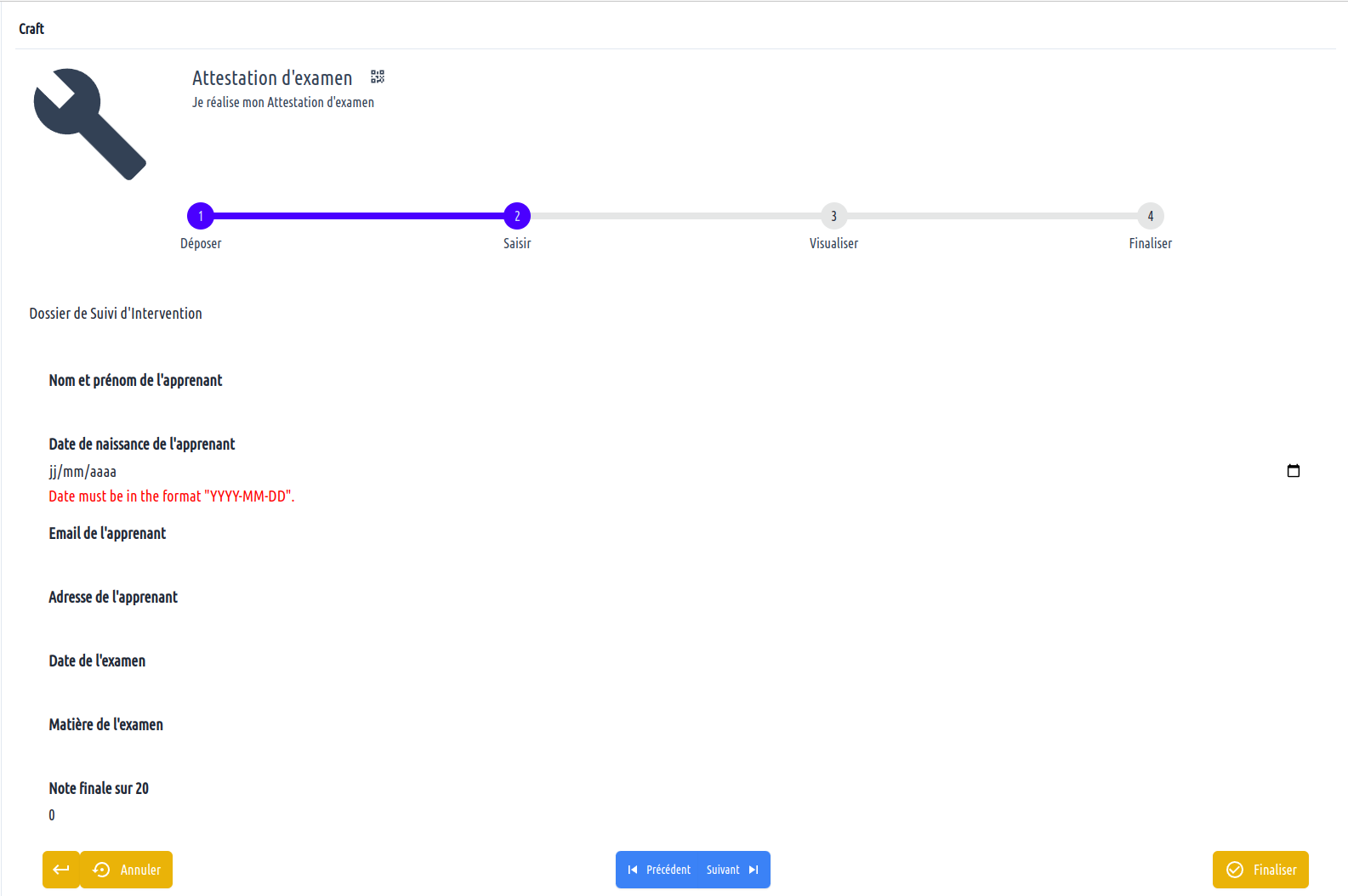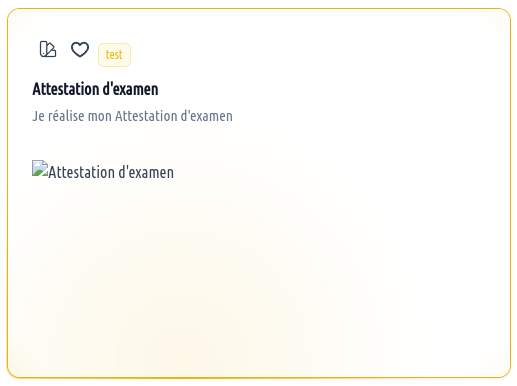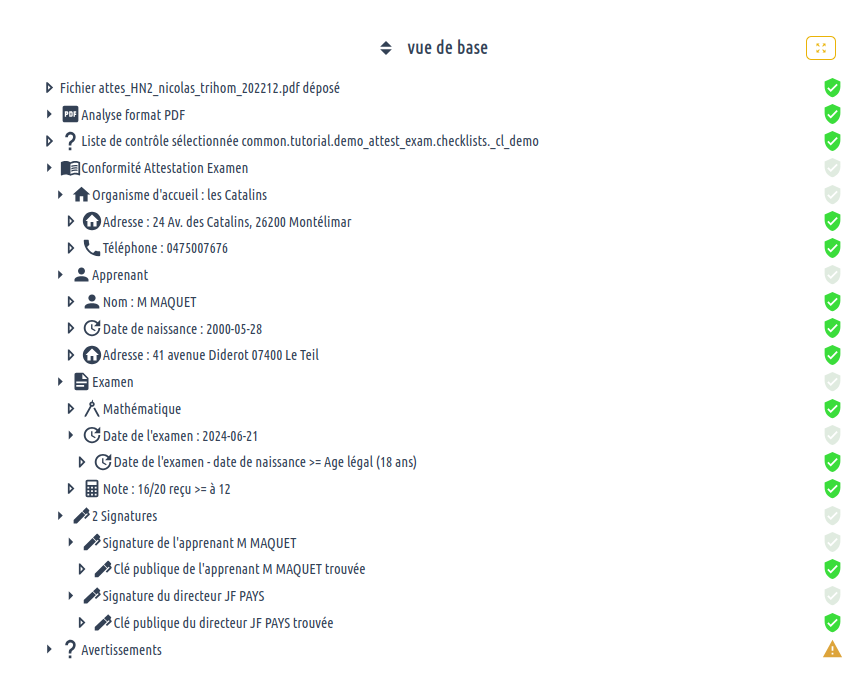

·
Creating a craftform
How to create a craftform based on a use case with an examination certificate

How to create your own craftform ?
Let's have a look at a use case based on a genuine document (the document used here is an examination certificate)
- List all the information in the document
- Keep all useful data and create the skeleton / structure of the document
- Create the form using YAML language
Let's get into the details
The writer of the examination certificate wants to be able to create his document via paxpar.tech
Advantages
Here are a number of advantages when generating your document via the platform, rather than using a common text editor.
One can :
- Resubmit the generated document to quickly and efficiently edit it again
- Deal with a document no matter how overloaded it may be with metadata, photos or even PDFs
- benefit from the automatic completion of the form, simply by dropping in a document which has formerly been generated via the platform
The desired craftform

Procedure
To create the craftform, we need to create several files:
base.craftform.yaml: .yaml file used to name and identify the craftformschema.yaml: a .yaml file used to define the form
base.craftform.yaml file
This file is used to identify and display the craftform in the crafts' gallery.
The minimum configuration of this file is:
$schema: https://paxpar.tech/schema/common.tutorial_demo_attest_exam.craftforms.attest_exam.base.craftform/1
name: Examination Certificate
version: "1"
desc: I craft an examination certificate
The information listed in this file are :
name: which is used to specify the name displayedversion: which is used to specify the version number for this documentdesc: which is used to specify the description displayed in the gallery
There are other settings available, which allow you to add more details to your form, so we can end up with a file like this:
# yaml-language-server: $schema=https://paxpar.gitlab.io/schemas/craftform-1.0.schema.json
$schema: https://paxpar.tech/schema/common.tutorial_demo_attest_exam.craftforms.attest_exam.base.craftform/1
name: examination certificate
version: "1"
desc: |
I craft an examination certificate
image: mdi:wrench
gallery:
published: true
tags:
- test
Thanks to this file, our form is displayed in the list of craftforms:

schema.yaml file
This file, written in YAML but using the JSON Schema standard, is used to create and set up your document creation form.
List of key information
Before you start creating the document, you first need to note down the information it contains. In our example, we have the document of an examination certificate, which proves and validates that a learner has passed or failed a test.
We therefore have the following information
- the full name of the organisation or school
- the organisation or school's address
- the organisation or school's telephone number
- the learner's name
- the learner's date of birth
- the learner's address
- the examination date
- the examination subject
- the final score
We have chosen to keep only the key information, which will be checked using the checklist.

These key information must appear in the metadata linked to the document. Thus, we have the following key points
- the learner's first and last name
- the learner's date of birth
- the learner's address
- the examination date
- the examination subject
- the final score
'Types' of key information
Now that we have picked required information, half the job is done. All you need to do now is to specify the types of information you've just selected.
In our case, all the strings are words. regarding certain pieces of information, such as the date, you can add more details, and specify, for example, that the format of the string is a date.
And so, you end up having :
| Information in the document | key name | Type | Format |
|---|---|---|---|
| the learner's first and last name | nom | type string | / |
| the learner's date of birth | date_naissance | type string | date format |
| the learner's address | adresse | type string | / |
| the examination date | date_examen | type string | date format |
| the examination subject | matiere | type string | / |
| the final score | note | type string | / |
Defining the form
Only two lines are needed to create the form:
title: Exam certificate
type: object
However you then need to define the fields in the form, and to do this you add the line properties:, which will contain all the fields in the form.
In order to do so, now that you're done with the rough work, you can simply do as for the learner's name in the yaml example hereafter
nom:
title: Learner's first name and last name # title: it is used to specify the title displayed on the craft
type: string # type: it is used to specify the type of field, in this case plain text.
In the case of a field with a specific format, such as dates, we need to add a format:
date_naissance:
title: Learner's date of birth
type: string
format: date # Here, we specify that the field has a date format (YYYY-MM-DD)
We can then repeat these steps to complete the form in order to craft the examination certificate:
title: Exam certificate
type: object
properties:
nom:
title: Learner's first and last name
type: string
date_naissance:
title: Learner's date of birth
type: string
format: date
adresse:
title: Learner's address
type: string
date_examen:
title: Examination date
type: string
format: date
matiere:
title: Examination subject
type: string
note:
title: Final score out of 20
type: string
However, there is an issue with the current configuration: the score can be any word. But word/20 is not a proper score. And 100/20 is not a proper score either. So we need to adapt, and set more details to the craftform.
title: Exam certificate
type: object
properties:
nom:
title: Learner's first and last name
type: string
date_naissance:
title: Learner's date of birth
type: string
format: date
adresse:
title: Learner's address
type: string
date_examen:
title: Examination date
type: string
format: date
matiere:
title: Examination subject
type: string
note:
title: Final score out of 20
type: number # because the score is a figure composed of a single digit or of multiple digits
minimum: 0 # because the score cannot be less than 0
maximum: 20 # because the score cannot be more than 20
And so we have our document craftform.
The document's template is as important as the document's craftform. To find out more about the template, please clic here
Appendix
https://json-schema.org/understanding-json-schema/reference/string#built-in-formats